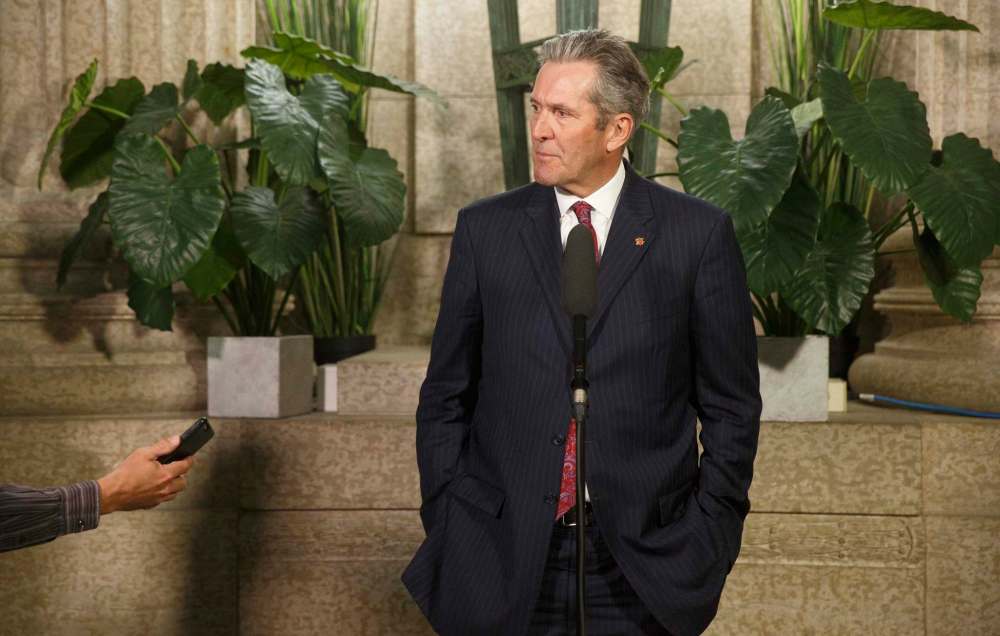Stakes are high for organized labour in upcoming provincial election
Read this article for free:
or
Already have an account? Log in here »
To continue reading, please subscribe:
Monthly Digital Subscription
$19 $0 for the first 4 weeks*
- Enjoy unlimited reading on winnipegfreepress.com
- Read the E-Edition, our digital replica newspaper
- Access News Break, our award-winning app
- Play interactive puzzles
*No charge for four weeks then billed as $19 plus GST every four weeks. Offer only available to new and qualified returning subscribers. Cancel any time.
Read unlimited articles for free today:
or
Already have an account? Log in here »
Hey there, time traveller!
This article was published 04/07/2019 (2004 days ago), so information in it may no longer be current.
Of all the special interests in Manitoba, it would seem organized labour has the most to win — or lose — in the upcoming provincial election.
Just consider the Progressive Conservative government of Manitoba’s record on labour issues over the past three years, and you will understand why the stakes are so high for unions, particularly those in the public sector. It has been a non-stop torrent of tough love from Premier Brian Pallister.
The premier had barely settled into the comfy chair in his corner office at the Manitoba legislature when he disbanded blue-ribbon advisory councils that gave labour parallel access on policy to that of business-sector representatives. He then tabled legislation imposing wage freezes on all unionized provincial workers. That law was never proclaimed, but the Pallister government got its wage freeze simply by not bargaining.

Then the premier announced legislation that would force health-care workers to re-organize, from 180 different unionized groups to about 40. The new law has forced unions to campaign against each other to be chosen to represent health workers, a scenario that has led to bitter and divisive confrontations among labour groups.
In education, funding has been virtually frozen, forcing some school divisions to lay off teachers and support staff. At the same time, Education Minister Kelvin Goertzen has openly questioned the commitment of the province’s teachers to producing better outcomes.
And then there’s the hospital reorganization. Three emergency departments have or will be closed and reclassified as urgent care centres. Numerous other specialty programs are being redistributed among hospitals. These changes have translated into disruption and uncertainty for unionized health-care workers, some of whom have faced difficult choices about where and when they would be working in the future.
Some of the unions most affected by the Pallister policies — particularly the Manitoba Nurses Union, the Manitoba Teacher’s Society and the Manitoba Government and General Employees Union — have fought back with pointed advertising campaigns accusing the Pallister government of undermining key public services. Several unions, operating under the umbrella of the Manitoba Federation of Labour, have two ongoing court challenges of the wage freeze and health representation laws.
It all adds up to an incendiary environment leading up to a critical provincial election this September. And while labour relations will likely not be a ballot question, this election should serve as a litmus test for the political influence of organized labour.
In other words, after three years of deliberately provocative anti-labour laws and policies, unions must prove that they still have the political muscle to put a dent in the Pallister government mandate. If Pallister cruises to victory, particularly in Winnipeg, where so many provincial public servants live and work, labour will have been exposed as a political non-factor.
How could labour make its presence felt in this vote? Traditionally, labour has attempted to influence provincial politics through a variety of channels.
In the old days, unions would provide direct financial support to parties and candidates, almost exclusively of the NDP variety. That practice ended in the early 2000s when NDP premier Gary Doer passed a law banning union and corporate donations, and eliminating the paid volunteer support that many unions utilized to support individual NDP riding campaigns.
Since the law changed, unions have used their financial resources for legal challenges, or to pay for advertising that either directly or indirectly attacks or supports various political parties. This has included advertising before and during election campaigns. Labour continues to support the NDP, but in less direct fashion, by encouraging individuals to volunteer on their own time to support the campaign.

The Tories have long resented labour’s attempts to influence elections, particularly when it comes to third-party advertising. The Tories believe, and rightly so, that they are at a disadvantage because there are virtually no special-interest groups that will take out ads to support their policies. It seems as if all the organizations that want to weigh into election advertising come from the left wing of the political spectrum, and thus only benefit similarly inclined parties such as the NDP.
Again, Pallister wasted little time addressing that historic concern. His government passed legislation in 2017 that severely restricted campaign-period advertising to prevent any communication “that takes a position on an issue with which a registered party or candidate is associated.” That’s a very broad restriction, and it’s quite likely unconstitutional, but it should be very effective in nullifying the influence of public-sector unions in the upcoming Manitoba election campaign.
For example, this new restriction would prevent the Manitoba Nurses Union from taking out advertisements during the campaign that advocate for the re-opening of three Winnipeg emergency rooms. Closing the three ERs is a policy of the PC government; re-opening the ERs is a policy supported by the Liberals and NDP. Any ads that protest the ER closures would certainly be to the benefit of those parties that want to re-open them. Thus, they are not allowed.
Effectively gagging third parties during a campaign period is a pretty big advantage for any incumbent government. But it’s not the only trick Pallister has used to dampen the influence of unions in the next election campaign.
Perhaps it’s a coincidence, perhaps not, but the summer election campaign recently confirmed by Pallister will directly overlap with the health-care representation votes.
With a Sept. 10 election date, and a campaign that can run between 28 and 35 days, Pallister is expected to drop the campaign writ sometime in early August. The health-care representation votes — in which tens of thousands of health-care workers will vote on which union they want to represent them going forward — start on Aug. 8 and go to Aug. 22.
The overlap of the representation votes with the provincial campaign will undoubtedly drain the time and energy of hard-core union activists, the people who are most likely to commit their personal time to canvassing for the NDP. The representation votes will be completed a bit more than two weeks before the provincial election, so perhaps there is time to do both. Either way, NDP volunteer resources will be stretched very thin.
Add together all of the tools and tricks that Pallister has used to distract and disable unions in the upcoming election campaign, and you have a scenario in which just when they need to be at their political best, the province’s biggest labour organizations may be left on the sidelines, unable to make any appreciable impact on the final outcome.

It should be noted that there are many Manitobans who believe unions — and all special interests, for that matter — should not have any involvement in elections. For those people, the fact Pallister has snookered unions in this election will viewed as a huge net positive, and may serve to galvanize core support on election day.
For those who do not count themselves among the core of Tory support — and that would include supporters of other parties and people who voted Tory in last election but have no deep association with Mr. Pallister’s party — the strident anti-labour policies could provoke an anti-government backlash at the polls. But it’s going to be tough, given the circumstances described above.
Either way, once you assemble all of the competing forces at work, it’s easy to see why this election is not just about picking the next government of the province. It’s also going to determine, perhaps once and for all, whether labour has any future role in Manitoba politics.
dan.lett@freepress.mb.ca

Dan Lett
Columnist
Born and raised in and around Toronto, Dan Lett came to Winnipeg in 1986, less than a year out of journalism school with a lifelong dream to be a newspaper reporter.
Our newsroom depends on a growing audience of readers to power our journalism. If you are not a paid reader, please consider becoming a subscriber.
Our newsroom depends on its audience of readers to power our journalism. Thank you for your support.
History
Updated on Friday, July 5, 2019 7:21 PM CDT: Adds detail












